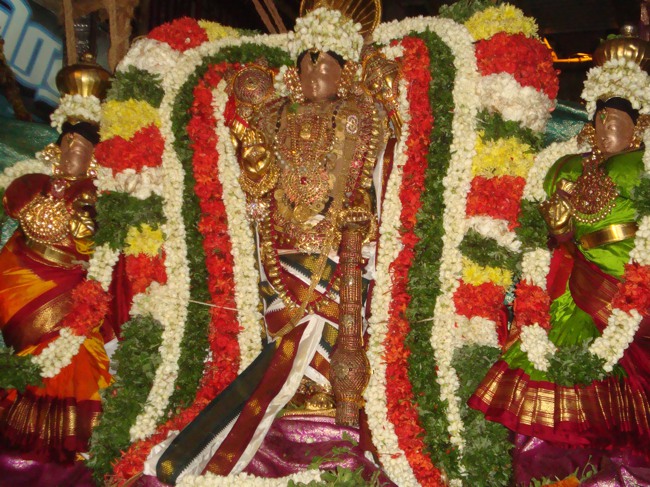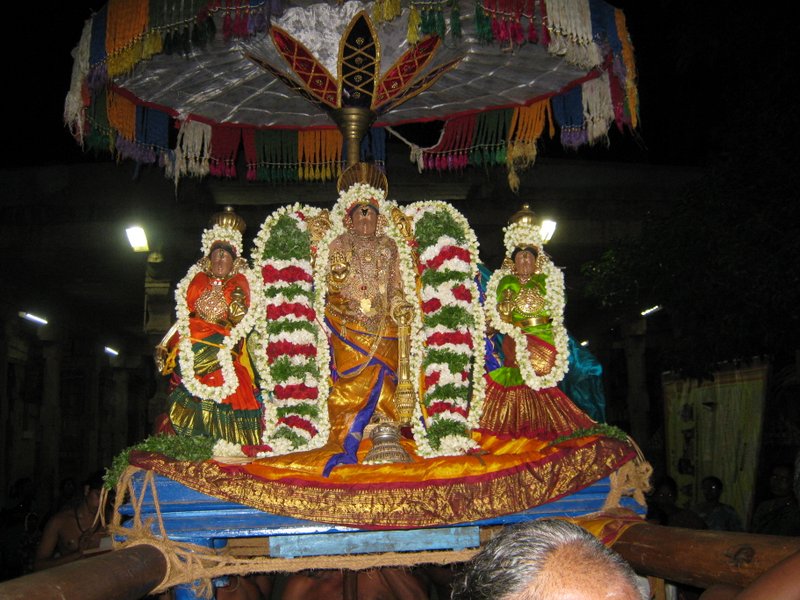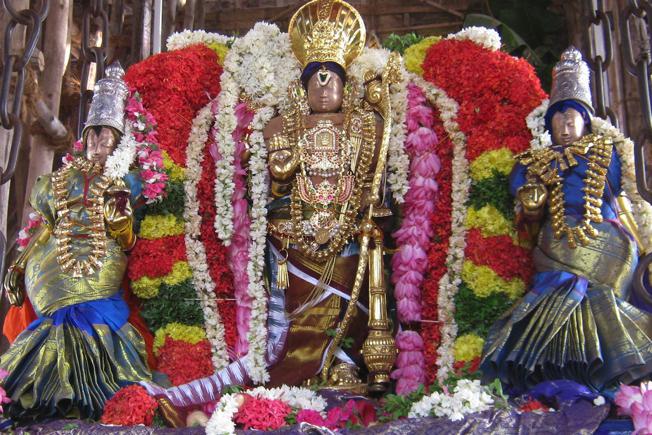Article by Sri Sadagopan Iyengar Swami, Coimbatore
Weapons are usually ugly, literally and figuratively. No one calls a machine gun beautiful, or a grenade, much less an armoured tank (except perhaps a terrorist). They have absolutely no redeeming feature to them, being meant solely for mass destruction, meant only to cause sadness and sorrow and to take away that precious thing which most of us take for granted—Life. We thus find that anything that deals out death and destruction and little else, can never be beautiful in any sense.
Hence if I say that weapons also double as adornments, people would definitely look at me strangely and would probably construe that I am referring to terrorists, who constantly tote guns and grenades, considering them to be adornments to their person. Though none would believe it, it is the Lord I refer to, who is always armed to His teeth, ready to rush to the rescue of a devotee in distress—“sadA panchAyudhee bibhrat sa na: SrIranga nAyaka:” It is a well-chronicled fact that the Lord totes several weapons in His hands and whenever we picturise Him in our mind’s eye, it is as accompanied by these weapons.

One important difference between the Lord’s weapons and others’ is that the former are used for both protecting and preserving devotees on the one hand and for destroying their detractors. Unlike weapons of human creation, which are meant solely to cause damage and devastation, the Lord’s arsenal is for a dual purpose, as indicated. Hence it is no wonder that the divine armoury is extremely beautiful and enticing to look at, serving at once as lethal weapons and luminous adornments to the Lord’s arms.
All are agreed that the Lord’s principal weapons are five—The Shankham, The Chakram, The GadA (Mace), asi (Sword) and the ShArngam (Bow). Of these five, it is the Chakram or Sudarsanam, which commands primacy and is known as the King of Weapons—“HEti RAja”. As such, SudarsanAzhwan has a lot of stotrams composed on him—the SudarsanAshtakam, the HEti RAja stavam, the Sudarsana Satakam (poorva and uttara satakams, comprising two hundred slokas in all) etc. to name a few. At several divyadesams, separate sannidhis have been allotted to ChakrattAzhwar and devotees delight in circumambulation in his shrine, as could be seen at Srirangam and other places.
However, there is another worthy, who is no less magnificent, no less Sudarsanam (good-looking), no less potent and no less dear to the Lord, who does not attract as much attention and adulation as the Chakram, but is all the same a strong, silent performer worthy of all our admiration. Whenever there is an enumeration of the Lord’s weapons, it is his name that is mentioned ahead of others’, indicating his primacy in the divine scheme of things. You may refer to not one but any number of instances, where the Lord’s weapons find mention—in all of them, the Shankham is always mentioned first, followed by the other AyudhAs. Look at the following for example—
“Shankha chakra gadA pANe! DvArakA nilaya! Achyuta!” (Draupati’s appeal while being disrobed in the Kaurava darbAr)
“Tamasa: paramaO dhAtA Shankha chakra gadAdhara:” (Mandodari’s tribute to Sri Raghava, in Srimad Ramayanam)
“Shankha chakra gadA asi ShArngAdi asankhEya divyAyudha! (Sri Ramanuja in Gadyam)
“Sangennum chakkaram ennum tuzhAi ennum—igganE sollum”
“SanginOdum nEmiyOdum tAmarai kaNgalOdum”
“Sangu vil vAL tandu chakkara kaiyyarkku”
“VeLlai suri SangOdu Azhi Endi tAmarai KaNnan”
“Sangodu chakkaram kaNdu ugandadum tAmarai kaNgalukku attru teerndadum”
(Sri Nammazhwar)
All these denote in no uncertain terms the primacy the Shankham enjoys, among the Lord’s weapons. What could be the reason behind this phenomenon of the Shankham being accorded pride of place, despite the Chakram being obviously more popular and enjoying greater visibility?
The answer to this puzzle lies in the NAcchiyAr Tirumozhi of Sri Andal.
Perhaps to compensate in advance for the lack of adequate mention by PoorvAcharyas, Sri Andal devotes all of ten pasurams for the adulation of Sri PAnchajanyam, the glorious shankham adorning the Lord’s left hand.
ChakrattAzhvan might be the much- adulated arsenal of the Lord, but it is the Lord’s Shankham that gets to taste the incredibly sweet lips and mouth of Emperuman. It is therefore to the Shankham we must turn, as Sri Andal does, if we want to get a true picture of how tasty the Lord’s lips are. For, when the Lord blows the Conch, His coral lips and fragrant mouth come into close contact with the Shankham, affording it a delectable taste, which is normally the exclusive preserve of the Divine Consorts.
“Is the Lord’s mouth fragrant as scented camphor? Or is it the type of fragrance exuded by the lovely lotus?” Sri Andal seeks confidential information (which is known only to Sri Devi and Sri Bhoodevi) from Sri PAnchajanyAzhwan—
“Karuppooram nArumO kamala poo nArumO
TiruppavaLa sevvai tAn tittitirukkumO?”
Maruppositta MAdhavan tan vAi suvayum nAttramum
Virupputtru kEtkindrEn sol Azhi veN SangE!”
Since this is a divine secret, Sri Andal places Sri Panchajanyam in the position of an Acharya and seeks upadEsam on the taste and fragrance of the Lord’s lips, says Sri Azhagia MaNavALa PerumAL nAyAnAr—
“Karuppooram nArumO! Kamala poo nArumO!….endru dEsikarai kEtkum padiyAna soundarya sArasyam uLLitta bhOgyataiyai udayOmum nAm allOmO endrA pOlE”
We are able to glean quite a lot of information about the Shankham, from these ten pasurams of Sri Kodai Nacchiar. For instance, we get to know that the Shankham, though originally from the unfathomable depths of the ocean, grew up in the body of an asurA known as “Panchajanan”, from which it attained the name “PAnchajanyam”. It is pure white in colour, symbolising the epitome of Sattva guNam, of unalloyed goodness.

Sri Andal’s descriptions of the PAnchajanyam are indeed glorious and graphic. The Lord looks like a huge mountain—“Pacchai mA malai pOl mEni”. On this mountain, the pale wintry moon, the “Sharat Chandran” rises slowly and beautifully. This is what the Shankham, with its pearly white complexion, looks like, sitting on the Lord’s left arm, resembling the glorious Moon in colour, in affording immediate bliss at sight, etc.—
“Tada varayin meedE sharat kAla Chandiran
idaiyuvAvil vandu ezhundAl pOl”
The Shankham’s resemblance to the Moon is emphasized in the next pasuram—
“Chandira mandilam pOl DAmOdaran kaiyil
antaram ondru indri Eri”.
We are told by the PanchAyudha Stotram that the PAnchajanyam resembles not one, but millions of Moons shining simultaneously—
“Tam PAnchajanyam sashi kOti shubhram Shankham sadAham sharaNam prapdyE”
Sri Andal speaks with envy about the several distinctions the Shankham has managed to garner.
If we need some favour from the Lord, it is to the Shankham that we have to apply and not to any other acolyte, for, the PAnchajanyam “has the Lord’s ears”, so to say, nestling close to His left ear, as it does. From its vantage position, it looks as if the Shankham is forever whispering secrets and sweet nothings into Emperuman’s ears, unbeknownst to others and also putting in a word on behalf of devotees who need the Lord’s favours—
“avan seviyil mandiram koLvAyE pOlum valam puriyE!”
We know how difficult and strenuous it is to visit holy places, for having a spiritually cleansing dip in the various puNya teertthams. Whether it be the Ganga or the Yamuna, they lie at a great distance, involving a lot of time, expenditure and physical strain to bathe in them. With absolutely no effort on its part, the Shankham is able to bathe daily in the holiest of waters, holier than any of those known to mankind, viz., the sweet juices from the Lord’s mouth—“SeNkaN Mal tannudaya vAi teerttham pAyndu Ada vallAi ValampuriyE!”.
Swami Desikan confirms this in Sri Devanayaka Panchasat—“VamsEna Shankha patinA cha nishEvitam tE bimbAdharam”
Food and Shelter form the essential requisites for any person. Some can eat just porridge “Kanji”), while some are able to do justice to a sumptuous meal. While some reside in humble huts, some are fortunate to have palaces for their stay. However, more fortunate than any one, as far as food and shelter are concerned, is the PAnchajanyam, which has the sweet juices of the Lord’s mouth for its staple food and sleeps comfortably in the most exalted of shelters, viz., the Lord’s lotus-like, soft and supple palm. Can the glory of the Shankham be measured at all, asks Sri Andal—“Indiranum unnOdu selvatthukku ElAnE”, “ShankarayA! Un selvam sAla azhagiyadE”.
By monopolising access to the Lord’s fragrant lips and mouth, the Shankham generates immense envy in the minds of the fairer sex, who too would like their share of the treasure. The Shankham’s incalculable good fortune, in having for its constant consumption liquids sweeter than nectar and holier than the holiest of sacred waters, make the 16000 and odd Consorts of the Lord green with envy and livid with fury, says Sri Andal—
“peN padayAr un mEl perum poosal chAttrugindrAr”
“PadinAram ayiravar dEvimAr pArtthiruppa
madhu vAyil kondAl pOl Madhavan tan vAyamudam
poduvAga uNbadanai pukku nee undakkAl
chidayAro! UnnOdu sol Azhi VeNsangE!”
The Shankham is not only the symbol of Shuddha Sattvam, it is also the embodiment of immeasurable wisdom. It was through a mere touch of the Shankham that the infant Dhruva, bewildered beyond measure by the sudden appearance of the Lord before his eyes and unable to find the right words to praise the Lord, was afforded eternal wisdom, which made him burst into verses filled with devotion and erudition—
“Shankha prAntEna Govinda: tam pasparsha kritAnjalim
utAnapAdam anagham dvija varya! Jagatpati:” (Sri Vishnupuranam)
However, a major doubt assails us—we have been speaking of the Shankham as an “Ayudham”, a weapon, and all that we have seen so far indicates only a docile disposition. Is the Shankham really effective as a weapon and if so, how can it cause harm to the Lord’s opponents, not being endowed with a “cutting edge”, like other weapons of distinction like the Chakram and the Sword? Nor can the PAnchajanyam be used as a “blunt instrument” to cause damage, like the Mace KoumOdaki!
The Shankham is by far superior to the other components of the Lord’s arsenal, endowed with the power of making foes drop dead due to sheer fear, shock and trauma, occasioned by its benumbing boom—
“VishnO: mukhOttAnila pooritasya yasya dhvani: danava darpa hantA
tam PAnchajanyam sashi kOti shubhram Shankham sadAham sharaNam prapadyE”.
The Shankham does a clean job, with its victims just dropping dead, unlike the gory and bloody deaths caused by its peers like the Chakram and the Sword. As proof of the PAnchajanyam’s potency, we find that the moment Sri Krishna and Arjuna blew their conches in the battle field of Kurukshetra, the Kaurava army practically dropped dead with fear and shock, making Arjuna’s job of disposing them off much easier than it would have been otherwise. The following Gita slokas attest to this—
“MAdhava: PANdavaschaiva divyou Shankhou pradadhmatu:
PAnchajanyam HrisheekEsa: DEvadattam Dhananjaya:
“sa ghOshO DhArtarAshtrANAm hridayAni vyadArayat”
Expanding on these beautiful verses, Sri Ramanuja says that victory for the Pandavas was a foregone conclusion, once the deafening and terrifying boom of these Shankhas tore through the hearts of the Kauravas—
“SarvEsvarEsvara: ParthasArathI rathIcha PANdu tanaya: trailOkya vijayOpakaraNa bhootE mahati syandanE stitthou trailOkyam kampayantou, Sreemat Panchajanya DEvadattou divyou shankhou pradadhmatu:”. The words “TrailOkyam kampayantou” appear to be a verbatim translation of the Tiruppavai lines, “GyAlatthai ellAm nadunga muralvana”, testifying to the deep roots that this prabandam had taken in the mind of the Tiruppavai Jeer.
Sri Periyazhwar performs mangalAsasanam to this Shankham, which boomed terrifyingly, reducing opposing armies to mere jelly—
“padai pOr pukku muzhangum ap Panchajanyamum pallANdE!”
The normal position of the Shankham is on the left hand of the Lord—“kooonEru sangam idatthAn”. Lest we get the wrong idea that the Shankham’s principal role is destructive, to assure us that it indeed has a supportive, protective and preservative role too, the Lord sports the same in His right hand, at Tirukkovilur, says Swami Desikan in Sri DEhalIsa Stuti—
“Chakrasya daitya danujAdishu vAma bhAvam
Shankhasya cha Ashrita janEshu dakshinatvam
Vyaktam pradarsayasi GOpapurAdhirAja!
Vyatyasya noonam anayO: kara samprayOgam”.
The strains from the Shankham, while being unbearably terrifying to opponents’ ears, are indeed sweet music to those of devotees. We hence see Sri Kodai Naachiar wishing the Shankha nAdam to be part of the marriage festivities, at Her divine wedding with the Lord- “mattaLam kotta, vari sangam nindru ooda”
Have you seen the Lord holding only the Shankham? You would be prompted to reply even without thinking that it could not be so, for the Lord is always seen at all divya desams sporting both the Divine Discus and the Cosmic Conch. However, just to prove you wrong, the Lord does hold only the PAnchajanyam, at TiruvallikkENi, in His bewitching role as PArthasArathy, adhering to His promise that He would not touch a weapon during the Kurukshetra war. However, little did the ignorant DuryOdhana know that the innocent-looking Shankham could be as potent a weapon as the dreaded ChakrAyudham.

Compared to the burning and brilliant SudarsanAzhwar (“anal Azhi”), true to its origins,(the ocean), the Shankham is cool and comforting, and shares its birthplace with Sri Mahalakshmi, a distinction unavailable to the other AyudhAs. And being dear to the Divine Consort, the PAnchajanyam automatically occupies the pride of place in the Divine Household, enjoying the dual advantage of privity to both the Lord and His Consort.
To cut a long story short, the Shankham is the “coolest” of the Lord’s weapons, incorporating the dual-purpose technology of protectiveness and pleasurableness to devotees and striking terror in the hearts of others. It has not only the Lord’s ear, but His mouth too, and, due to its vantage position, is the object of not only “Neighbour’s envy” (of Sudarsanam) but also that of the Divine Consorts.
Article by Sri Sadagopan Iyengar Swami, Coimbatore








Hare Krishna _/\_
Shri U.Ve. Sadagopan Swami’s Articles are always beautiful, very informative and interesting to read. This Article on Lord’s Shankham is, I think, most excellent. He has compiled all the available information on Shankham and presented in a wonderful language and style with quotes from almost every source. Many many Pranaams to the Swami and thanks to Anudinam Website for sharing the Article.
What a wonderful narration of Panchajanyam & Sudharshanar! Their purpose is so beautifully put forth that, a true devotee will really enjoy this write up.
Interesting and informative.
May I have his contact number? I am at coimbatore. Would like to interact and learn
Very well written and brilliantly brought out.
Swamin, I have one doubt
In the series Garuda, Chakra, Namam, Sangu and Hanuman
What is the difference between between the standing and sitting postures of Garuda and Hanuman. What do each signify?
Can you pl elaborate?